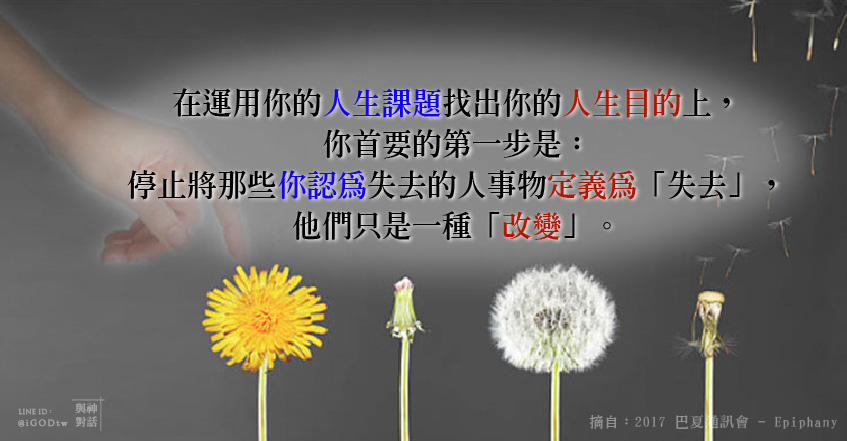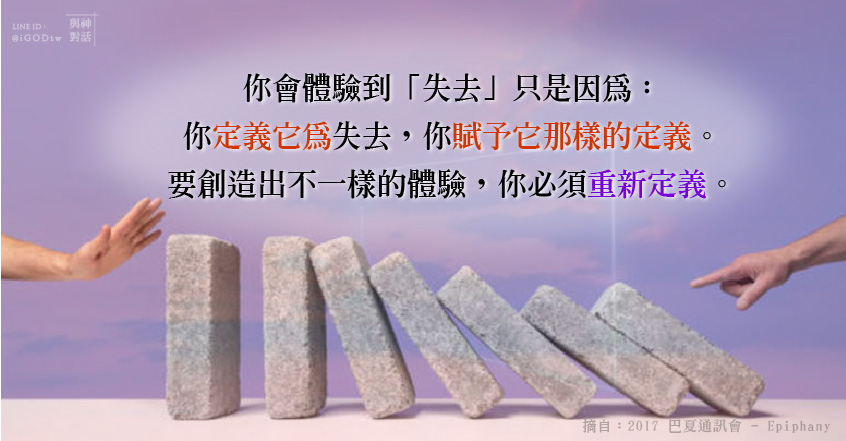【「你的實相」是你定義的產物和意識的投射】
巴夏精選短片(2分33秒)【「你的實相」是你定義的產物和意識的投射】Bashar119
影片摘自:2017-Epiphany
購買網址:http://www.basharstore.com/epiphany/
中文翻譯:Jimmy
【「你的實相」是你定義的產物和意識的投射】
Your Reality is the product of your definition and projection of your consciousness

Question is I feel like I’ve had a reoccurring theme of loss, you know, loss of loved ones in my life…
我的問題是,我覺得我一直都有一種不斷被困在「失去」的人生課題中,你知道的,失去生命中我所愛的人…
Yes?
好的。
And I am trying to use that to move forward to find what my purpose is.
而我正在試圖運用那人生課題以向前邁進,來找出我的人生目的是什麼。
All right, well, the first step is to stop defining things as loss. It’s just a change.
好的,嗯,你首要的第一步是:停止將它定義為「失去」,它只是一種「改變」。
You only experience it as a loss because you’re defining it as a loss. So stop defining it as something being lost.
你會體驗到「失去」只是因為:你定義它為失去(你賦予它那樣的定義)。因此,不要再將它定義為「失去」某事物。
Right, that makes sense.
好的,有道理。
That’s the first step, you have to redefine in order to have a different experience.
那是第一步:要創造出不一樣的體驗,你必須重新定義。
Because physical reality isn’t real on its own. It’s only the product of what you define it to be, because it’s just a projection of your consciousness.
因為物質實相本身並非真實的。它只是「你的定義」下的產物,因為物質實相只是「你的意識」的一種投射。
So if you change the definition, you change the experience, because you change the perspective of how you interact with that portion or reflection of your consciousness, yes?
所以如果你改變了「定義」,你的「體驗」也會跟著改變,因為你改變了「你如何與你意識的那部分或那反映互動」的觀點,懂嗎?
Yes.
我懂。
In the same way that if again, you’re looking in the mirror, you could see your reflection frowning, “Oh no! I’ve lost.”
再次重述,這概念就如同你正在照鏡子,你可以看見自己在鏡子裡的反射是在皺眉頭,噢不!我已失去了。
But then you could understand it’s not about changing the reflection physically. It’s about changing your own face.
但那時候你能了解,重點並不在具體去改變那鏡子的反射,而是在改變你自己臉上的表情。
Then you’ll see a different reflection, yes?
然後你就會看見不同的反射,明白嗎?
Yes.
明白。
So you redefine the idea of the state you prefer by saying, “Well, that doesn’t matter what I’m seeing in the reflection. Just because the reflection is frowning, that doesn’t in any way, shape or form prevent me from deciding to smile”.
所以你重新定義自己喜歡的狀態——藉由對自己說:「好吧,我在鏡子的反射中看到什麼並沒有關係,只因為鏡子裡的反射在皺著眉頭,那並不以任何方式或形式阻止我決定要微笑。」
“I can just decide to smile. And when I do, the reflection will have no choice but to smile back.”
「我可以僅是決定要微笑。而當我這麼做時,鏡中的反射就只能別無選擇地報以微笑。」
That’s true.
沒錯。
But if you are waiting for the reflection to change, you’ll be waiting a long time, because it can’t change before you do.
但假如你(被動地)在等待鏡子裡的反射改變,你會等上非常久的時間。因為,它無法在你做出改變之前有所改變。
So definitions create reflections, if you want to see a different reflection, you have to change the definition in the same way that you have to change the expression on your face to see a different one in the mirror.
所以說,「定義」創造出「反映」,如果你想看見不同的反映或反射,你必須改變你心中的定義,正如你必須改變臉上的表情才能看見鏡中不同的反射一樣。
Make sense?
有道理嗎。
Yes, that does make sense.
有的,確實有道理。
So that’s the first step, and then you’ll see things differently. You’ll be able to use the changes that have happened in more powerful and positive ways.
所以那是第一步,然後你會看見不同的(開始以不同角度看待)事物。你將能夠以更有力量且更正向的方式運用那些已經發生的「改變」(而不再是「失去」)。
You can see them for what they could be, and how you could use them to learn more about yourself, and become more of who you really prefer to be in that way. Yes?
你能夠看見它們的潛質,並看見「你能如何運用它們來更加了解自己」,並以那(更了解自己的)方式而成為「你真正想成為的自己」。懂嗎?
Yes.
懂了。
Is this helping?
這對你有幫助嗎?
Yes, definitely.
有的,當然有。




